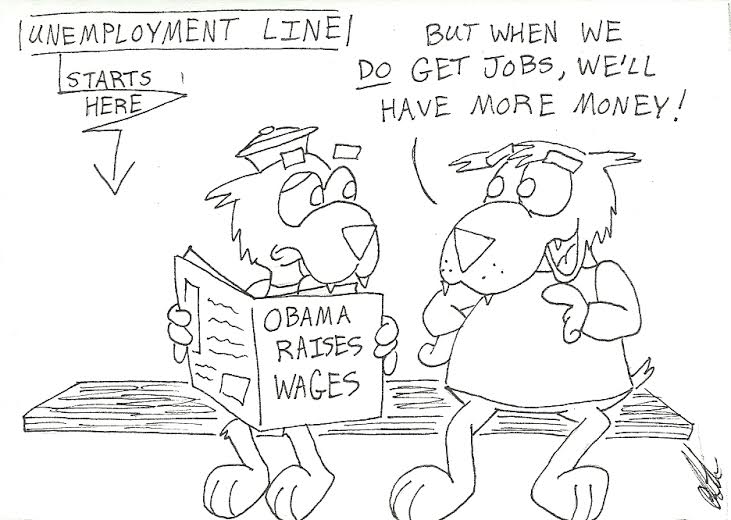Seeking desperately for a popular policy that can help him recover from the disastrous rollout of the Affordable Care Act, the president has now turned his sights to raising the national minimum wage. And as has often been the case with this president, he yet again demonstrates how little he understands business and economics.
The argument about minimum wage often digresses into two separate arguments: one about whether the minimum wage is a “living wage” and another about the wage obligations that companies have to their employees. What neither of these arguments deals with is a more fundamental and underlying question: what business the federal government has in determining a minimum wage in the first place.
Like many economic variables, wages are highly regional. Even in a geographic area as small as a county, the buying power of a dollar can vary widely as one moves from an urban center to the suburbs, and then out to into a rural area. Establishing a “one wage fits all” minimum wage will underserve the areas in which the cost of living is higher, and may create an economic barrier for businesses operating in areas with a lower cost of living.
Whether a minimum wage at the state level makes sense is a decision best left to each individual state; some may choose to defer to more regional definitions of minimum wage, or some may choose to have none at all. The Founding Fathers understood the benefits of a limited federal government and strong federalism; the president would do well to look to this principle for guidance as he blindly entrenches the federal government into more of the country’s affairs.
The current federal minimum wage is $7.25 per hour. Whether or not this is a livable wage depends on who is trying to live off of it. According to the Bureau of Labor Statistics, approximately half of the 3.6 million minimum wage workers are younger than the age of 25 years old. These are people who likely have the lowest cost of living, and the people with the least marketable experience. They’re also the people who have the most working years ahead of them and the most motivation to (re)train themselves toward more marketable vocations. There may be no better motivation to increase one’s skills than a job that barely pays one’s basic living expenses, but those who choose not to make themselves more marketable are entirely free to continue generating minimal value for a minimum wage. That’s their choice, and it’s nobody else’s responsibility to coddle them economically.
Raising the federal minimum wage will hurt the country’s most vulnerable wage earners. Like the president, businesses cannot simply raise wages by fiat; labor costs are a substantial component of most businesses’ expenses, and an increase in salaries means a cut somewhere else (or a net rise in the cost of products). Raising the cost of society’s least valuable workers will provide additional incentive to companies to seek automation (to replace these workers entirely), to consolidate job responsibilities in more expensive employees (whose net output is higher than that of minimum wage workers), or to simply eliminate some of these positions. Either way, the net result is a shrinking labor pool.
The president has cleverly positioned the Affordable Care Act as a tool to “prevent” people from being bound to low-wage jobs, further shifting the responsibility to pay for healthcare from the individual person to the wage-earning members of society. By raising the minimum wage, even more workers will leave the labor pool (voluntarily or involuntarily)—representing a further drain on the economy. Not only will these workers not be earning wages, but the companies that once employed them (or could have employed them) will suffer from a smaller and more expensive labor pool.
It’s not just fast-food companies that will suffer from this. A myriad of healthcare industries such as assisted-living facilities and nonprofit organizations struggle to pay their employees minimum wage. If there are people willing to work in these jobs for less, why should the government disallow these companies from entering into an employment contract with willing employees?
The freedom to succeed comes with the freedom to fail and the freedom to barely get by. Freedom also means that people are free to seek better opportunities if they feel underpaid or undervalued in their current employment circumstances. As much as Barack Obama would love to rewrite the rules of economics and freedom, he can’t, and raising the federal minimum wage will (as it has long been) remain fiscally irresponsible of the federal government.











